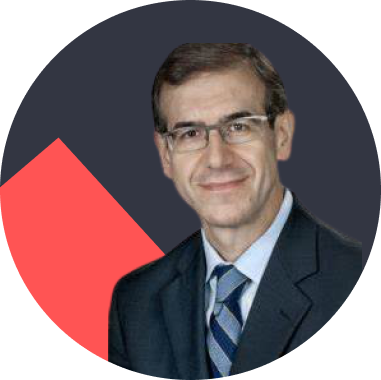Asking To Be ‘Coached Hard’ with
Dr. Eleftherios Mylonakis

A Conversation with Dr. Eleftherios Mylonakis
“Don’t focus on titles. Just focus on being a doctor.”
Bio
Eleftherios Mylonakis, MD, Ph.D., FIDSA, is the Charles CJ Carpenter Professor of Infectious Diseases at Brown University. He is also the Chief of Infectious Diseases at Rhode Island Hospital and The Miriam Hospital and the Director of the COBRE Center for Antimicrobial Resistance and Therapeutic Discovery. He has eight patents, has edited five books, and has published almost four-hundred articles in peer-reviewed literature.
Dr. Mylonakis holds many titles. Which one does he believe is most important?
“Dr. Mylonakis succinctly points out that the only title of any real significance to a physician is the title doctor because as he indicates, doctor is the only title that is earned and thus the only title that should be deserved.”
As he notes, not even our last names are something we deserve. But the name doctor is different. It is uniquely special to the physician.
Rather than becoming infatuated with titles, he admonishes physicians to be focused on becoming good doctors.
How should young physicians focus their attention?
Because time is short, Dr. Mylonakis makes a sober observation that it is not long before the youngest physicians in the room become the oldest members. “In the blink of an eye a career can be over.” This is why it is essential not to waste time.
“Many young people waste a good deal of time between residency and fellowship and then between fellowship and finding out what they are going to work on.” This is a problem that plagues many young physicians.
His advice for young people is that they have a humble self-confidence. A humility that says there is much to be known but the confidence that is necessary to be a qualified physician.
From Dr. Mylonakis’ perspective, young people have a ten-year window that dictates the direction they will take. Thus, the decisions they make in this period of time are critical. These ten years lay the foundation for their career that follows.
Is there a way we can learn from wisdom rather than experience?
Dr. Mylonakis believes physicians can minimize their learning time if they seek to learn, without always making discoveries the hard way. He gives an example of when his girls were young and he had to teach them not to touch the stove. Still, they had this innate desire to discover this reality for themselves. Some people want to experience life the hard way.
Instead, Dr. Mylonakis urges aspiring physicians to minimize any efforts to learn the hard way and instead focus on actively listening to the life’s stories of others. “Not listening in a passive way, but in a way that follows a life trajectory.”
“Think critically but don’t criticize. Evaluate and see what you can take from others and what matches your goals. Minimize mistakes by listening to everybody that has something to teach you something. Dig into their stories. Look inside yourself as well. Understand what excites and motivates you. Don’t focus on what other people are doing. Focus on your own goals. You know what you want to achieve in life. See what others can teach you and learn to minimize mistakes.”
What do you wish you knew when you were thirty?
As Dr. Mylonakis indicates, learning is very different today than just fifteen years ago. “In the past, mentoring was about sharing information. Now, you can Google everything. There are protocols, videos, and figures for essentially every technique.”
“The role of a mentor now is to help young people take that energy and focus it in the right way.”
He states, “Don’t think about the whole path that lies ahead. As Confucius said, the travel of 3000 miles starts with the ground under your feet.”
Dr. Mylonakis goes on to highlight the need for balance in one’s career, family, and their personal lives. “No one teaches this in school. This is more important than physics, chemistry or any other lessons that we learn. Everyone is under prepared in this area. This is such a difficult part of life.”
Life coaching is common in other practices. Why is this not the case in the medical world?
It is here that Dr. Mylonakis makes an especially keen observation. He points out that perhaps the reason more physicians do not have personal life coaches is because it is almost impossible to coach a physician unless you are one yourself.
As an example, he shares the story of a physician who is working in an ICU as a student or intern and their patient dies. The person who passes may be a young person in their early twenties or thirties. For other people, this would have been the most difficult part of their year. But for the physician, they must be ready to attend to another patient within a matter of minutes following this death. As Dr. Mylonakis notes, it is impossible to process death this quickly.
“There are unique stresses every physician deals with that are hard for a well-meaning life coach to understand. This is why it is not as common as in other parts of life. Those who have walked in the same shoes that other physicians have understand what it takes.”
Should physicians focus more on talking to other doctors as opposed to finding help in books?
As Dr. Mylonakis reflects, there has been a sort of odd evolution in the mentorship world. Mentors today fear they will hurt the feelings of those they mentor and so they will tend to hold back critical information and be timid in the way they share. “They have a tendency to fluff situations, say some good words, offer some generalities and that’s it.”
He gives a challenge for the mentee. From his vantage point, the onus is on the mentee to approach the mentor and ask for a higher level of accountability. They must ask to be coached hard. He notes that this is critical because if a person is setting a wrong trajectory in life, five years down the road they are going to wonder why their mentor did not offer any corrections. “It is critical to develop an understanding of honesty.”
Finally, Dr. Mylonakis offers this piece of wisdom. “Pick a mentor based on personality, not based on any area of interest you might have. Personality is what is most important.”
Pearls of Wisdom
- Focus on being a good doctor and let the titles follow our work.
- Rather than trying to think about the whole path that lies ahead, focus on the next steps. Because when we shine the torch five feet, the next five feet will be visible.Go and be proactive in reaching out to mentors, especially those who are not afraid to be honest with us.
- Go and be proactive in reaching out to mentors, especially those who are not afraid to be honest with us.
